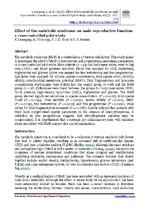Effect of the metabolic syndrome on male reproductive function: a case-controlled pilot study

View/
Date
2014Author
Leisegang, Kristian
Bouic, Patrick J.D.
Henkel, Ralf
Metadata
Show full item recordAbstract
The metabolic syndrome (MetS) is a constellation of various risk factors. This
study aimed to investigate the effect of MetS on testosterone and progesterone,
and semen parameters, in a case-controlled pilot study. Male patients (n = 54)
had body mass index, waist-to-hip ratio (WHR) and blood pressure recorded.
Blood was analysed for HDL cholesterol, triglycerides and glucose. Saliva was
assayed for free testosterone and free progesterone. Ejaculates were analysed for
volume, sperm concentration, total sperm count, motility, vitality, mitochondrial
membrane potential (MMP), DNA fragmentation and leucocyte concentration.
Participants were divided into the control group (n = 28) and the
MetS group (n = 26). Differences were found between the groups for body
mass index, WHR, blood pressure, high-density lipoprotein (HDL), triglycerides
and glucose. The MetS group showed significant reductions in sperm
concentration (P = 0.0026), total sperm count (P = 0.0034), total motility
(P = 0.0291), sperm vitality (P = 0.002), MMP (P = 0.0039), free testosterone
(P = 0.0093) and free progesterone (P = 0.0130), while values for DNA fragmentation
increased (P = 0.0287). Results indicate that patients with MetS
have compromised sperm parameters in the absence of leucocytospermia. A
reduction in free progesterone suggests that steroidogenesis cascades may be
compromised. It is hypothesised that a systemic pro-inflammatory state with
oxidative stress associated with MetS may provide a novel explanation.
